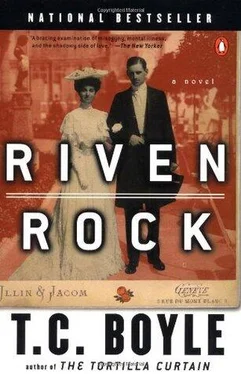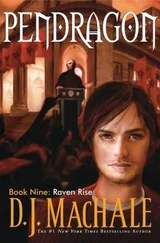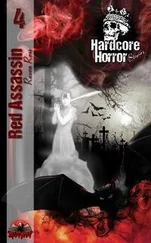T. Boyle - Riven Rock
Здесь есть возможность читать онлайн «T. Boyle - Riven Rock» весь текст электронной книги совершенно бесплатно (целиком полную версию без сокращений). В некоторых случаях можно слушать аудио, скачать через торрент в формате fb2 и присутствует краткое содержание. Год выпуска: 1999, Издательство: Penguin Books, Жанр: Современная проза, на английском языке. Описание произведения, (предисловие) а так же отзывы посетителей доступны на портале библиотеки ЛибКат.
- Название:Riven Rock
- Автор:
- Издательство:Penguin Books
- Жанр:
- Год:1999
- ISBN:нет данных
- Рейтинг книги:5 / 5. Голосов: 1
-
Избранное:Добавить в избранное
- Отзывы:
-
Ваша оценка:
- 100
- 1
- 2
- 3
- 4
- 5
Riven Rock: краткое содержание, описание и аннотация
Предлагаем к чтению аннотацию, описание, краткое содержание или предисловие (зависит от того, что написал сам автор книги «Riven Rock»). Если вы не нашли необходимую информацию о книге — напишите в комментариях, мы постараемся отыскать её.
Riven Rock — читать онлайн бесплатно полную книгу (весь текст) целиком
Ниже представлен текст книги, разбитый по страницам. Система сохранения места последней прочитанной страницы, позволяет с удобством читать онлайн бесплатно книгу «Riven Rock», без необходимости каждый раз заново искать на чём Вы остановились. Поставьте закладку, и сможете в любой момент перейти на страницу, на которой закончили чтение.
Интервал:
Закладка:
But Mr. McCormick merely stood there, filthy and bleeding, watching the men dig. Stribling kept his head down, and he dug steadily, but O‘Kane could see that he was concentrating on the doomed flower bed, trying to cut his losses and confine the scope of the excavation. It was past three and both Stribling and his assistant were up to their hips in a trench you could have flooded and rowed a boat across when Mr. McCormick folded his arms and said, “That’s it. That’s enough.”
They all looked up hopefully, all five of them, Stribling and the Irishman in a sweat, Brush all blustered out, Mart half comatose and O‘Kane bored to tears and desperate for a drink.
“You can bury him now,” Mr. McCormick said.
They all looked at one another. It was O‘Kane who finally spoke up. “Who — the gopher?”
Mr. McCormick slowly shook his head and looked up at the sky. “Dr. H-Hoch, ”he said.
When the year turned—‘19 into ’20, that is — O‘Kane’s worst fears about the Katherines of the world were confirmed. Riding in on the skirts of Petticoat Rule, the Drys and the Bible-thumpers got the Volstead Act passed, prohibiting “the manufacture, sale or transportation of intoxicating liquors,” and before women even got their vote (a proposition about which O’Kane was dubious to begin with) he was denied his God-given right to drink himself into a stupor — even in the privacy of his own antiseptic room. January 18, 1920: that was the day of infamy. The day of doom. The day every last shred of joy went out of his life. He watched in shock and disbelief as the saloons of Spanishtown boarded up their doors and the Women’s Christian Temperance Union paraded through the streets, pouring out good whiskey in the gutter. Menhoff’s was still open, but only as a restaurant, and Cody would serve you a beer with your steak if you were foolish enough to ask for one — near beer, 5 percent alcohol, less than you’d find in a can of sauerkraut.
Oh, O‘Kane had stocked up, of course, stashing six cases of beer and two of rye whiskey under his bed and secreting the odd bottle of bourbon in his wardrobe and ten pints of sloe gin in the steamer trunk he kept in Mrs. Fitzmaurice’s attic — he even buried half a dozen jugs of wine just inside the front gate at Riven Rock — but he was bereft without the conviviality of the saloons. So what if he’d spent half his adult life considering various positions on God, immortality and Ford transmissions as expressed by one drunken halfwit or another? What else was there to do? He tried reading. He bought himself a Victrola. Rain beat at the windows and every day brought news of some fool going blind and deaf drinking antifreeze or rubbing atcohot — and how about that fireman in Pennsylvania who bought up all the lilac hair tonic in town and drowned in a sea of his own vomit? O’Kane went steadily through his stock, mostly alone, but sometimes in the company of Mart or Pat or one of the lost souls who used to inhabit the front room at Menhoff‘s, and as the bottles turned up empty, he felt like a condemned man marking off the days until his execution.
Into this vale of tears stepped Jim Isringhausen.
Jim came out in February to open up his brother’s place and make his move on one thousand acres of prime flat well-watered citrus land in Goleta, four miles to the north of Santa Barbara. Demand was up since the War ended and people back East were just going crazy for oranges, lemons, tangerines, limes, grapefruits, kumquats, you name it, and what they were getting from Florida was a drop in the bucket compared to what California could produce. Now was the time to get in on it before every used car salesman and soda jerk with a hundred bucks in his pocket got wind of it, not to mention the big conglomerates. And he came to O‘Kane first, because O’Kane had been with him from the beginning on this, and he’d been patient, sitting on his hands for two years now while Jim consolidated his holdings and lined up investors, and Jim appreciated that, he did.
He told O‘Kane all this on their way out to inspect the property on a day of biblical splendor, the sea leaping, the mountains chiseled, the sun hanging in the blue-veined sky like a big Valencia orange. Jim was looking good. He was wearing a checked sport jacket and white duck trousers, spats over his shoes, and his hair was frozen to his head with French pomade and his mustache so neat and refined it was barely there. The car was new, a yellow Mercer roadster with blood-red wire wheels and a fold-down canvas top. The wind was in their faces. Everything flashed and winked in the brilliant California light. Jim Isringhausen passed O’Kane a silver flask and O‘Kane drank deep of ambrosia — Scotch whiskey, the real stuff, smoke and peat and the very baaing of the sheep all in one swallow, whiskey like you couldn’t find anymore and maybe never would again.
“So what did you say you’ve got to put up,” Jim said, gently disengaging the flask from O‘Kane’s reluctant fingers and putting it to his own lips, “—three thousand?”
The wind beat at O‘Kane’s hair, the sun warmed his face. He squinted his eyes and felt the hope come up in him again, a breath of it, anyway. “Just about. Twenty-nine and something.”
Jim turned to him with the flask. He had the look of a priest on his face, all sympathy and concern. “That’s not your whole life savings, is it? Because I wouldn’t want to put you under any strain here — I mean, this is as close to a sure thing as you’ll find on this green earth, but nothing’s a hundred percent, you know that, don’t you?”
O‘Kane shrugged. He lifted the flask to his lips, casual as a millionaire. “No,” he lied, “I’ve got some put away still.”
He was no idiot. He knew what Jim was saying: there was risk involved. But there was risk involved in anything, in walking across the street, gulping your food, looking into a woman’s eyes on a Saturday night. This was his chance, and he was going to take it — all he needed to see was a row of orange trees, and he was in.
“All right,” Jim said, “call it three then — if you can round it off between now and next Tuesday, which is when we close the deal. At two hundred an acre, we need to raise twenty thousand dollars down against the bank loan and another thousand in reserve to hire a bunch of wops to water the trees and pick the fruit. Three’ll get you thirty shares, at a hundred per. Sound good, pardner?”
“Sure,” O‘Kane said.
Jim put both hands on the wheel as they swept too fast into a turn banked the wrong way; the wind sheared at them, there was a delicious jolt and Jim downshifted and hit the gas on the straightaway that suddenly opened up before them. “By the way,” he said, “Dolores sends her love.”
O‘Kane chewed over this bit of information as the flask came back to his hand and they swung off the pavement and onto a snaking dirt road that bloomed with dust and insects and flying bits of chaff. Dolores sends her love. Well, fine — O’Kane hadn’t seen or heard from her in two years, not since her husband came back from the War. He’d asked Jim about that, trying to sound casual, and Jim had told him they were over in Europe, reconstructing a villa someplace in Italy — not that it mattered two figs to O‘Kane one way or the other. Women were a thing of the past for him. He’d given up. After Rosaleen and poor Eddie Jr. — and Giovannella.
He hadn’t seen her either, the widow Capolupo. He heard she’d moved back in with her parents, pregnant with a dead man’s baby — or so she claimed. And he hadn’t heard whether she’d given birth to a wop or half a wop, and he just didn’t care, not anymore. If he could make his fortune here, in oranges, and get out from under the McCormicks and set himself up someplace — in San Francisco maybe, or Los Angeles — well then he might just possibly think about finding some young girl of twenty with some grace and style about her and settle into his forties with something to show for his life. But right now he didn’t need the complications. Or the heartache either.
Читать дальшеИнтервал:
Закладка:
Похожие книги на «Riven Rock»
Представляем Вашему вниманию похожие книги на «Riven Rock» списком для выбора. Мы отобрали схожую по названию и смыслу литературу в надежде предоставить читателям больше вариантов отыскать новые, интересные, ещё непрочитанные произведения.
Обсуждение, отзывы о книге «Riven Rock» и просто собственные мнения читателей. Оставьте ваши комментарии, напишите, что Вы думаете о произведении, его смысле или главных героях. Укажите что конкретно понравилось, а что нет, и почему Вы так считаете.












